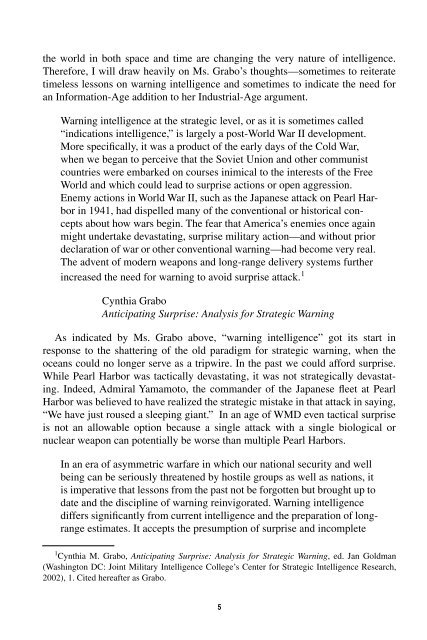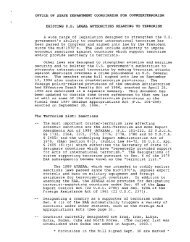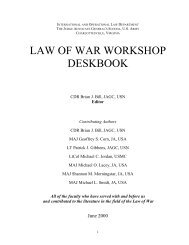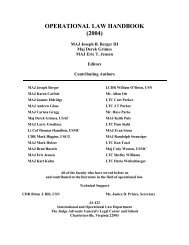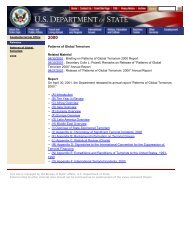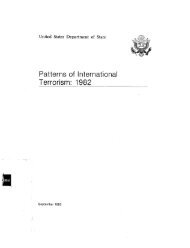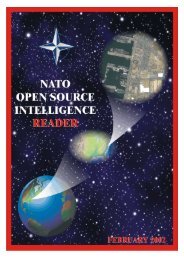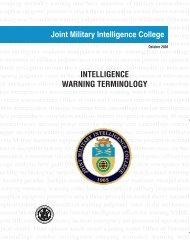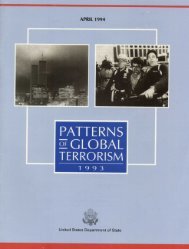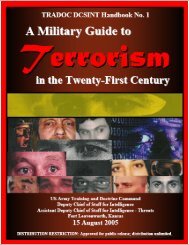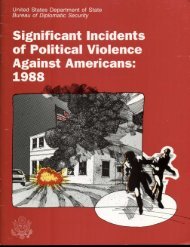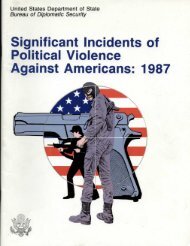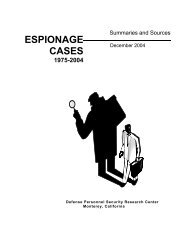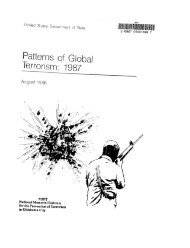Warning Analysis for the Information Age - Higgins Counterterrorism ...
Warning Analysis for the Information Age - Higgins Counterterrorism ...
Warning Analysis for the Information Age - Higgins Counterterrorism ...
Create successful ePaper yourself
Turn your PDF publications into a flip-book with our unique Google optimized e-Paper software.
<strong>the</strong> world in both space and time are changing <strong>the</strong> very nature of intelligence.There<strong>for</strong>e, I will draw heavily on Ms. Grabo’s thoughts—sometimes to reiteratetimeless lessons on warning intelligence and sometimes to indicate <strong>the</strong> need <strong>for</strong>an In<strong>for</strong>mation-<strong>Age</strong> addition to her Industrial-<strong>Age</strong> argument.<strong>Warning</strong> intelligence at <strong>the</strong> strategic level, or as it is sometimes called“indications intelligence,” is largely a post-World War II development.More specifically, it was a product of <strong>the</strong> early days of <strong>the</strong> Cold War,when we began to perceive that <strong>the</strong> Soviet Union and o<strong>the</strong>r communistcountries were embarked on courses inimical to <strong>the</strong> interests of <strong>the</strong> FreeWorld and which could lead to surprise actions or open aggression.Enemy actions in World War II, such as <strong>the</strong> Japanese attack on Pearl Harborin 1941, had dispelled many of <strong>the</strong> conventional or historical conceptsabout how wars begin. The fear that America’s enemies once againmight undertake devastating, surprise military action—and without priordeclaration of war or o<strong>the</strong>r conventional warning—had become very real.The advent of modern weapons and long-range delivery systems fur<strong>the</strong>rincreased <strong>the</strong> need <strong>for</strong> warning to avoid surprise attack. 1Cynthia GraboAnticipating Surprise: <strong>Analysis</strong> <strong>for</strong> Strategic <strong>Warning</strong>As indicated by Ms. Grabo above, “warning intelligence” got its start inresponse to <strong>the</strong> shattering of <strong>the</strong> old paradigm <strong>for</strong> strategic warning, when <strong>the</strong>oceans could no longer serve as a tripwire. In <strong>the</strong> past we could af<strong>for</strong>d surprise.While Pearl Harbor was tactically devastating, it was not strategically devastating.Indeed, Admiral Yamamoto, <strong>the</strong> commander of <strong>the</strong> Japanese fleet at PearlHarbor was believed to have realized <strong>the</strong> strategic mistake in that attack in saying,“We have just roused a sleeping giant.” In an age of WMD even tactical surpriseis not an allowable option because a single attack with a single biological ornuclear weapon can potentially be worse than multiple Pearl Harbors.In an era of asymmetric warfare in which our national security and wellbeing can be seriously threatened by hostile groups as well as nations, itis imperative that lessons from <strong>the</strong> past not be <strong>for</strong>gotten but brought up todate and <strong>the</strong> discipline of warning reinvigorated. <strong>Warning</strong> intelligencediffers significantly from current intelligence and <strong>the</strong> preparation of longrangeestimates. It accepts <strong>the</strong> presumption of surprise and incomplete1 Cynthia M. Grabo, Anticipating Surprise: <strong>Analysis</strong> <strong>for</strong> Strategic <strong>Warning</strong>, ed. Jan Goldman(Washington DC: Joint Military Intelligence College’s Center <strong>for</strong> Strategic Intelligence Research,2002), 1. Cited hereafter as Grabo.5


